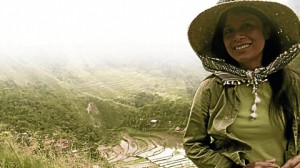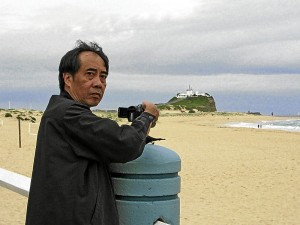‘Live your passion, learn the basics, and go for it’
(Butch Nolasco and Ditsi Carolino are among six pioneering Filipino independent filmmakers that the Inquirer is honoring in its 2nd Indie Tribute today.)

DITSI Carolino became a filmmaker because she wanted to serve. “This is the best way I know I can be useful.”photo: matt baguinon
Her docus ‘engage, enrage’
Documentarian Ditsi Carolino clearly doesn’t shy away from incendiary themes—from child labor to adult illiteracy, from juvenile detention to agrarian reform.
As Inquirer columnist Rina Jimenez-David once wrote, Carolino’s films “engage and enrage.”
Carolino explains that she ventured into filmmaking because, simply, she wanted to serve. “This is the best way I know I can be useful. It’s also very creative. There is something incredibly satisfying about making full use of your God-given talents to make a difference.”
Indeed, Carolino’s films have moved people to tears or to action, or both. “I don’t want audiences to just feel sorry for the marginalized … I want viewers to get off their asses and do something about it,” she quips.
“Bunso,” which shows the plight of children in prisons, proved instrumental in the passage of the Juvenile Justice Bill, which seeks to protect children in conflict with the law. A work in progress, “Lupang Hinarang” contributed to the passage of the Comprehensive Agrarian Reform Program Extension and Reform Bill.
“I like to think of my films as exposure or immersion pieces, a window to a world that many people consider as ‘social issues’ that don’t really affect their comfortable, professional lives,” she says. “Without being preachy, I challenge viewers to see the connection between poverty and corruption.”
For her honesty and courage, Carolino’s docus have been cited here and abroad.
The child-labor docu “Minsan Lang Sila Bata” won a Gawad CCP in 1996. It likewise garnered awards from the Film Academy of the Philippines (1997), the Brussels Independent Film Festival (1998) and the New York Festival for TV Programming (1999).
In 2003, “Riles” won the Royal Television Award for best factual (student) film in the United Kingdom, where she studied documentary filmmaking at the National Film and Television School. “Riles” also won best docu at the Cinemanila that same year. Two years later, “Bunso” won best short at the Urian awards.
More honors
Also for “Bunso,” Carolino won best director at the One World Human Rights International Film Festival in Prague; the grand prize at the EBS International Film Festival in Seoul in 2005; and the youth jury prize at the Perspektiv: Nuremberg International Human Rights Film Festival in 2006.
The Prague jury cited “Bunso” for achieving “empathy and closeness to her characters … humor and despair intermingle as the children are allowed to speak for themselves.”
In a previous report, Carolino said her Prague victory was “a miracle. We didn’t think we had a ghost of a chance. Almost all of the films in the fest were made in First World countries with budgets of 100,000 to 200,000 euros each.”
“Bunso” was also screened in festivals in Amsterdam, Toronto, Munich, Washington DC, among others.
Her latest docu, “Lupang Hinarang,” follows two sets of farmers who are fighting for their right to till land that the government had earlier declared rightfully theirs: Bukidnon’s Sumilao tribe, who marched from Mindanao to Malacañang, a 1,700-kilometer journey; and Negros Occidental’s Task Force Mapalad, whose members staged a hunger strike in front of the Department of Agrarian Reform office.
Carolino is currently filming the back stories of the farmers in “Lupang Hinarang,” along with two new docus on Philippine elections—“Ang Laban ni Abang” and “Si Noy, Si Riza, at Ka Jose.”
This filmmaker, who took up Sociology at the University of the Philippines and worked with a Davao-based NGO, once dreamed of becoming a doctor.
“I was taking up Biology, but while attending a sociology elective class under Prof. Randy David, I discovered that I was more interested in dissecting social and political events rather than dissecting cats and sharks,” she recalls.
In making docus, she strives to make a story “assume a face [that] viewers cannot forget. Thus, a social issue ceases to be just a topic; it becomes a real person they can care about.”
She counsels aspiring filmmakers: “Live your passion. Live authentically. Ask yourself how best you can make a difference and just go, go for it.” Bayani San Diego Jr.
‘Government, private sector should help’
How to get funding to sustain a career has always been the biggest problem of Filipino filmmakers, according to award-winning documentarian Edmundo “Butch” Nolasco Jr.
“It has always been economics,” he tells Inquirer. “Then there’s the issue of marketing and distribution. I believe there should be government involvement, as well as the participation of the private sector, to help young directors.”

BUTCH Nolasco advises aspiring filmmakers to study the masters here and abroad. “It’s the easiest way to learn basic storytelling techniques.”
With a degree in AB Communication Arts from the Ateneo de Manila, Nolasco joined ABS-CBN in 1971 as a production assistant-trainee for what was then Channel 4. He rose to the position of associate producer, then executive producer in July 1972.
Following the declaration of martial law, Nolasco joined the Social Communications Center (now Communication Foundation for Asia) as radio-TV production manager. In December 1974, he worked at J. Walter Thompson (Phils.) as TV commercial producer.
He was audio-visual manager for McCann-Erickson (Phils.) from 1978 to 1979, but rejoined J. Walter Thompson as broadcast production manager until 1985.
Big switch
Then he became a freelance TV commercial director up to 1991, concentrating on corporate videos and documentaries. He relates, “I was first commissioned to make a documentary on the 50th anniversary of Philippine Airlines. This started the big switch.”
Nolasco has won numerous awards and citations, including best TV documentary from the Film Academy of the Philippines in 2001 for “Siglo Filipino: Odyssey of a Nation;” the Catholic Mass Media award for best adult program in 2002 for “Lakas Sambayanan;” the CMMA for best TV documentary in 2003 for “A Legacy of Heroes: The Story of Bataan and Corregidor;” and again, the CMMA for best TV special event coverage in 2006 for “EDSA 1986: Mga Tinig ng Himagsikan.”
His “Legacy: Philippine World Heritage Sites” won the Gawad CCP first runner-up, documentary category, in 2004.
The following year, the same docu was first runner-up at the annual Moonrise Film Festival—dedicated to environmental issues—and winner of best cinematography.
Nolasco’s “Portrait: Rediscovering a Filipino Film Classic,” was declared one of the best documentaries of the past 20 years during the Gawad CCP in 2007.
In his works, the director has tackled such issues as education, early child development, the UN Millennium Development Goals and the peace process in war-torn Mindanao. Currently in post-production, Nolasco tells Inquirer, is a feature-length documentary on the 2010 elections, tentatively entitled “Confessions of a Congressional Candidate.”
His advice to young filmmakers: “Study the masters, here in the Philippines and also those based abroad, especially in Hollywood and Europe. It’s the easiest way to learn basic storytelling techniques.” Marinel Cruz